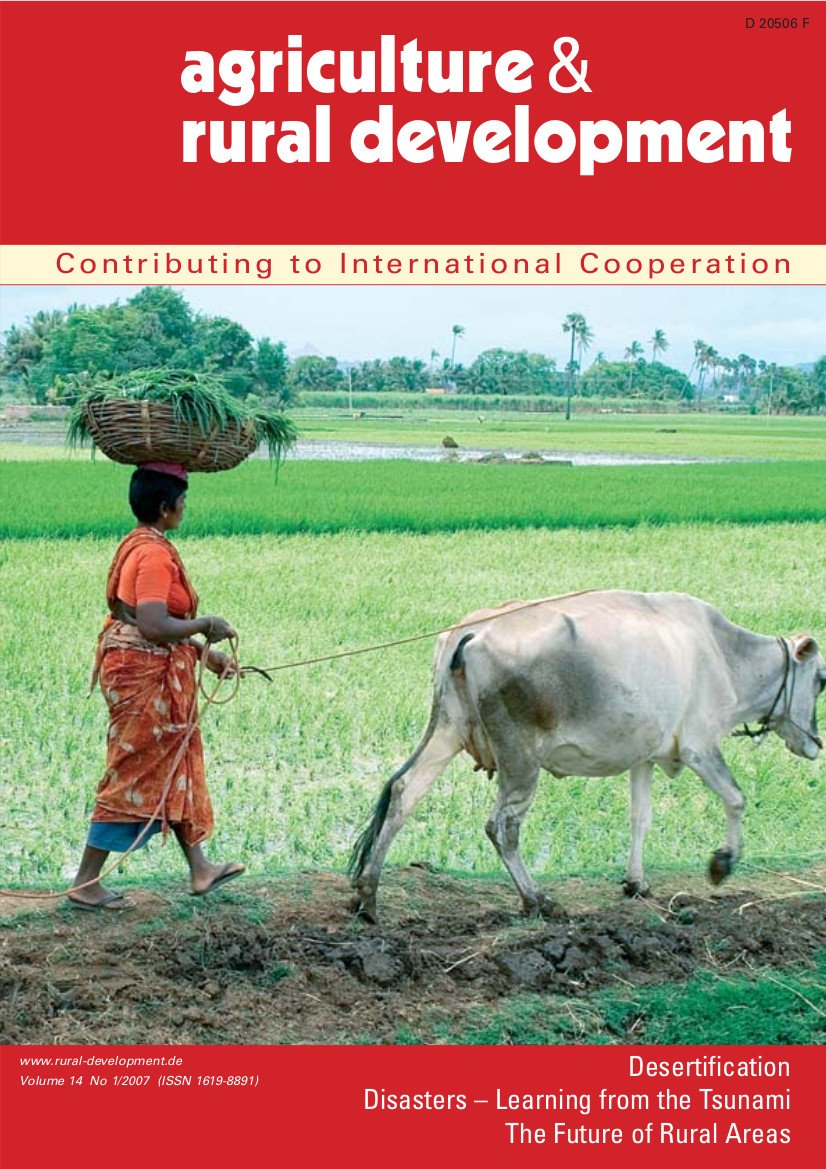Location
The international journal Rural 21 has dedicated more than 40 years to all topics surrounding rural development. Its ambition is to further those strategies and policies that strengthen rural areas of developing and newly industrialising countries and encourage their implementation. The journal addresses the complete range of relevant themes – from agriculture and fisheries via capacity building and education through to health and social security, energy supply and trade. Center-stage is always devoted to inquiring into how measures and strategies can contribute to global food security and to reducing poverty.
Rural 21 desires to further the dialogue between science and politics, the private sector, civil society and practitioners. Two platforms are designed for this purpose: Rural 21 in print is published four times a year, each issue highlighting a specific focus of rural development – this print edition is read in more than 150 countries. In parallel, Rural 21 online keeps the rural development community up to date on news and events, scientific findings and other print and online publications.
Rural 21 is published by DLG-Verlag GmbH in Frankfurt/Germany. Financial partners are BMZ (German Federal Ministry for Economic Cooperation and Development), GIZ (Deutsche Gesellschaft für Internationale Zusammenarbeit), DLG (German Agricultural Society – Deutsche Landwirtschaft-Gesellschaft), SDC (Swiss Agency for Development and Cooperation) and Helvetas Swiss Intercooperation.
The first issue of Rural 21 dates back to 1968. From 1974 to 2007, the journal was published in three languages entitled "entwicklung & ländlicher raum" / "agriculture & rural development" / "agriculture & développement rural". In 2008, the journal was relaunched as "Rural 21".
Members:
Resources
Displaying 296 - 300 of 319The Indian Supreme Court acknowledges the Right to Food as a Human Right
Life without liberty would result in some or the other form of slavery. Liberty cannot be there to a person having an empty stomach.The individual's right to life will have no meaning if the State fails to provide adequate food or food articles.The Indian Constitution provides «right to life» as a Fundamental
Right.That right is given a wide interpretation by the Supreme Court so as to include «right to food» so that democracy and full freedom can be achieved and slavery in any form is avoided.
Regional aspects - Sub-Saharan Africa. Combating desertification - the big challenge for the 21st Century
Hardest hit by desertification is Sub-Saharan Africa, where poverty is more widespread, preparedness for catastrophe is lower, and means for adequately coping with the phenomenon are very weak; two thirds of the arable land will be lost by 2025.The subcontinent needs improved integrated initiatives on local, national und multinational level for a sustainable natural resources management. Environmental Information systems can increase awareness and throw light on decision making processes on the complexity of desertification badly needed by most African countries.
The tsunami disaster - two years on Slow progress with reconstruction
The tsunami disaster on 26 December 2004 claimed more than 200,000 lives. It triggered an unprecedented outpouring of reconstruction assistance from both private and public donors.The prompt provision of emergency relief averted the threat of epidemics and prevented major movements of refugees out of the affected regions. However,many of the reconstruction measures failed due to poor coordination between the actors involved and the lack of expertise underlying some of the interventions.The reconstruction effort was also very slow to get off the ground.
Disaster prevention: Risk awareness is the key
The series of dramatic natural events is never ending. 2005 again illustrated that natural disasters are unavoidable. For disaster prevention systems to function properly, investments in raising risk awareness are key.
The future of rural areas from the German Development Cooperation perspective
Few aspects of development policy are better furnished with empirical evidence than the interplay between support for agriculture in the context of rural development and the reduction of poverty and hunger. It is therefore surprising that German Development Cooperation has today largely disengaged from activities in this area: Despite the evidence that practically nothing is more effective and sustainable than combating poverty where it is most often found, namely in the rural areas of poor countries,we fail to take that route.



